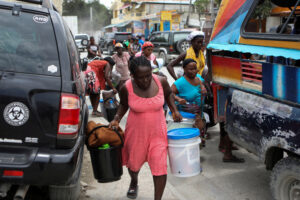Transgender adults were three times as likely as cisgender people to experience food insecurity this year, according to new data analyzed by the Williams Institute at UCLA. The data, which was collected by the Census Bureau’s Household Pulse Survey between June and October 2021, showed that more than a quarter of transgender adults in the United States reported sometimes or often not having enough to eat, compared with just 8 percent of cisgender adults. Trans people of color were especially vulnerable. Nearly 36 percent experienced food insecurity.
At the root of this, researchers say, is a web of discrimination that leaves trans Americans impoverished and unable to access food. Roughly 30 percent of trans people live in poverty, the Williams Institute has found.
“People are poor, and that’s why they don’t have enough food,” said Kerith J. Conron, research director at the Williams Institute, and the co-author, along with Kathryn K. O’Neill, of the new report on food insecurity. “It’s important to consider how stigma and discrimination impact economic resources across the life course,” she said. Bullying, harassment and discrimination can make it difficult to “complete high school, pursue higher education and secure better paying jobs,” she said, which is why she argues that laws like the Equality Act are key to helping lift transgender people out of poverty.
The federal Equality Act, which President Biden has called a priority for his administration, would ban discrimination against people based on sexual orientation and gender identity. The House passed the bill along party lines in February, but it stalled in the Senate.
Previous studies have found higher rates of food insecurity for lesbian, gay and bisexual people, but little research has focused exclusively on food access for transgender people. This summer was the first time the Census Bureau included questions about sexual orientation and gender identity in its survey of how the coronavirus pandemic is impacting households across the country.
Having that data can help pave the way toward solutions, Conron said.
For instance, the data showed that less than a third of income-eligible transgender people were enrolled in the Supplemental Nutrition Assistance Program. Though the federal program is intended to keep people from going hungry, the data shows most trans people aren’t using it.
The Census Bureau survey didn’t delve into causes for that disparity, but the National Women’s Law Center found last year that trans people face numerous barriers in applying for and using SNAP. Some trans people may not have documents that match their identity and gender presentation, and two states — Massachusetts and Missouri — put recipients’ photo identification on electronic benefit transfer cards. If the recipient’s identity and appearance no longer match what’s on the card, recipients may face discrimination at grocery stores, the D.C.-based nonprofit found.
Trans people may also struggle to meet the work requirements, which were tightened under the Trump administration. SNAP recipients must work 20 hours a week, but trans people are three times as likely to be unemployed, and more than 1 in 4 have lost a job because of bias, according to the National Center for Transgender Equality, whose 2015 U.S. Transgender Survey polled more than 28,000 trans people — the largest survey of trans people to date.
And even if trans people meet the work requirements and have the right documents to apply for SNAP, the National Women’s Law Center found that without anti-bias training, government employees can sometimes behave in ways that discourage trans individuals from accessing benefits.
Amiyah Taylor, a 23-year-old nonbinary person who works with trans people through the D.C. nonprofit Us Helping Us, said they know many trans people who’ve been misgendered or harassed as they tried to access the benefits.
“It becomes a circle of hardship,” Taylor said. “Going into these places, you don’t want judgment. There are a lot of people in the DMV area who don’t have knowledge of trans and nonbinary folks, and you have to explain everything. For people who have not gotten that legal name change, they’re having to be forced to use that birth name, which they hate. Everything they’ve worked up to, now they feel dehumanized.”
One trans friend nearly lost her benefits after she had facial feminization surgery, Taylor said, because a Department of Human Services worker thought the trans woman’s ID card didn’t look enough like her. And when Taylor went to access their own benefits, one security guard complimented their feminine outfit, but another noted Taylor’s purse, then called Taylor “sir.”
For Taylor, the experience was mostly frustrating, but other people find the discrimination so painful that they can’t bring themselves to apply. Taylor said simple solutions, such as asking an applicant for their pronouns, could help trans people feel safe as they visit government offices.
The Household Pulse Survey also found that relatively few transgender participants accessed free groceries through pantries or local food banks. That echoes a qualitative study conducted in Los Angeles and rural California, as well as a quantitative survey of trans people living in the Southeast.
In 2019, Jennifer Russomanno and Jennifer M. Jabson Tree, associate professors at the University of Tennessee in Knoxville, interviewed more than 100 trans and gender-nonconforming people in 12 states across the Southeast. The researchers found that 79 percent of their survey respondents had experienced food insecurity but that less than a quarter had turned to local food pantries for help.
“I literally had to rerun the numbers six times because I thought, this can’t be right,” Russomanno said. “It actually knocked me down.”
Churches run many of the food pantries in the Southeast, Russomanno said, and trans people told her that they had either experienced discrimination at food banks or were so afraid of experiencing discrimination that they didn’t even visit one. Some relied on food they found in dumpsters, Russomanno said, and others turned to friends for groceries.
“I had one person who told me he eats rice three times a day because that’s all he could afford,” Russomanno said. “I had people tell me they were literally starving, and they still would not go to a food pantry because of the discrimination.”
Russomanno sits on the Knoxville food policy council. After her paper came out last year, leaders at local food banks told her that they don’t want to discriminate against trans people and asked for her help in reaching those who need their services most.
Though Conron has found that food insecurity is a national problem that requires national policy changes, her previous research has also shown that the most effective solutions may be hyperlocal. In Boston, for instance, the nonprofit BAGLY learned during the pandemic that many young people couldn’t get to its center to access free food. The nonprofit tried using Uber Eats to deliver food, but ultimately determined that the best way to reach trans youth was to offer gift cards through the online vendor Tremendous.
“That way, people could download the money in gift cards, so if Stop and Shop was closest or Target was closest, they could get a gift card for a food place close to them,” Conron said.

And in Asheville, N.C., a trans-led organization found at the beginning of the pandemic that its community members were struggling to afford food. Hart Groves runs the Talya Mazuz Food Program at Tranzmissionin Asheville. Each week, Groves and a crew of volunteers gather donations from the local food bank, community members and a Trader Joe’s, and then distribute the food to trans people in need. Tranzmission does not require any proof of identification or income.
“We deliver food to multiple households each week,” Groves said. “We are a contactless service, so individuals don’t come to the pantry to get food. Instead, we pack it up and deliver it to their house. This is a safer option considering the realities of the pandemic, but it also offers access to certain individuals who perhaps wouldn’t be able to get to our office to shop.”
Russomanno would like to see similar programs across the country, but researchers and community activists need more data to best tailor their responses, she said. Her next research paper focuses on barriers trans people face in obtaining SNAP benefits.
“This is work that needs to be done,” Russomanno said. “I’m glad it’s getting more attention, because without this national population-based data, there’s no way to assess the severity of the problem. I’m hopeful with the Census adding these questions, and hopefully nationally based data sets will follow the same lead, we can have a bigger conversation about how we can address this in this country.”




